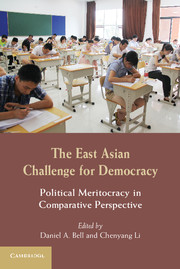Book contents
- Frontmatter
- Dedication
- Contents
- Contributing Authors
- Acknowledgments
- Introduction
- Section I The Theory of Political Meritocracy
- 1 Political Meritocracy and Meritorious Rule
- 2 A Confucian Version of Hybrid Regime
- 3 Confucian Meritocracy for Contemporary China
- 4 The Liberal Critique of Democracy
- 5 Meritocratic Representation
- Section II The History of Political Meritocracy
- Section III Realizing Political Meritocracy Today
- Index
- References
5 - Meritocratic Representation
Published online by Cambridge University Press: 05 June 2014
- Frontmatter
- Dedication
- Contents
- Contributing Authors
- Acknowledgments
- Introduction
- Section I The Theory of Political Meritocracy
- 1 Political Meritocracy and Meritorious Rule
- 2 A Confucian Version of Hybrid Regime
- 3 Confucian Meritocracy for Contemporary China
- 4 The Liberal Critique of Democracy
- 5 Meritocratic Representation
- Section II The History of Political Meritocracy
- Section III Realizing Political Meritocracy Today
- Index
- References
Summary
No individual or body can count as the representative of another unless selected or authorized to act in that role. The representative speaks and acts in the name of another individual or group, and this, unlike speaking or acting on another's behalf – say, speaking or acting as a self-appointed advocate – requires authorization in the role. This authorization raises two questions. First, is it legitimate? Is the representative selected by a suitable agent or agency and under suitable rules? Second, is it motivated? Is the selection made on the grounds that the candidate is distinctively eligible or qualified for a representative role?
Under electoral arrangements, authorization comes via the selection of the representative, directly or indirectly, on the basis of a popular vote. And it is the disposition to be responsive to the attitudes of electors, which that very mode of selection is designed to encourage, that qualifies the candidate to serve in a representative role. The candidate or deputy may be responsive at only a general level to the attitudes of electors – say, to their values or interests – or responsive to detailed wishes and instructions; in the first case, such a deputy will count as a trustee, in the second as a delegate.
- Type
- Chapter
- Information
- The East Asian Challenge for DemocracyPolitical Meritocracy in Comparative Perspective, pp. 138 - 158Publisher: Cambridge University PressPrint publication year: 2013
References
- 7
- Cited by



